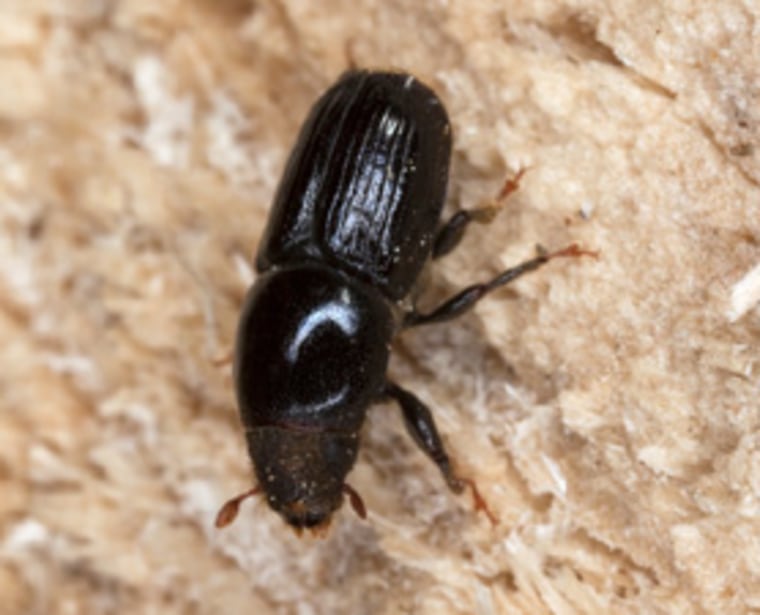Beetles don't like heavy metal or Rush Limbaugh, suggests new research, but the sounds that really drive them mad are manipulated versions of their own noises.
Beetles are destroying ponderosa, pinyon, lodgepole pines and other trees important to the ecosystem. The beetles have their place in the ecosystem too, of course, but climate change and human activities have allowed beetles to take over more than they should.
To combat such infestations, scientists thought up the "nastiest, most offensive sounds" they could. Those included recordings of Guns & Roses, Queen, Rush Limbaugh and manipulated versions of the insects' own sounds.
The scientists then played these recordings near beetle-infested trees that they brought into a lab setting. The sounds disrupted tunneling, mating and reproduction for the beetles, making it harder for the insects to eat through the trees.
The project, dubbed "Beetle Mania," concluded that acoustic stress may disrupt the tenacious insects' feeding and even cause the beetles to kill each other, according to a presentation recently at the National Meeting of the Entomological Society of America.
Richard Hofstetter, an entomology professor at Northern Arizona University who worked on the project, told Discovery News that "the most annoying sound" his colleague, Reagan McGuire, "could think of was Rush Limbaugh or rock music."
McGuire started to pump the sounds of Limbaugh into portions of infested tree trunks brought into their lab, but Hofstetter said McGuire "could not bear listening to Limbaugh, so he ended up playing Rush backwards, which still kept the voice and intonation the same, but the words were meaningless."
The researchers created "phloem sandwiches," slices of infested pine trees encased in Plexiglas, to build mini ant farm-like testing samples. Into these they next pumped heavy-metal music. They also continued to play the sounds made by the beetles.
The obvious musical choice would seem to have been The Beatles, but the scientists believe actual beetles wouldn't mind this band.
"I think bark beetles would be more disturbed by music that was very dynamic -- a lot of bangs, clicks, vibrations, and also periods of silence," Hofstetter explained. "So from what I know of The Beatles' music, I think bark beetles would probably prefer them over a lot of other music that is out there."
He and his colleagues found that while Limbaugh and the heavy metal initially bothered the beetles, the insects mostly ignored the sounds after a while.
The researchers next decided to record and manipulate the beetle-produced sounds. They focused on an aggression call produced by males of the "tree killer" Dendroctonus species.
By making this call longer and louder than usual, they altered the beetles' behavior.
"We found we could disrupt mating, tunneling and reproduction," Hofstetter said. "We could even make the beetles turn on each other, which normally they would not do."
This was particularly graphic when the researchers played the manipulated sounds right as a male and female beetle were about to mate.
Hofstetter said his team would "watch in horror as the male beetle would tear the female apart."
Wulfia Gronenberg, an associate professor of neuroscience, ecology and evolutionary biology at The University of Arizona, has also studied bark beetles. He told Discovery News, "I think what Dr. Hofstetter's team found is very interesting."
"There is still a lot of basic research to be done to better describe the hearing ability of the beetles, but after years of focusing on chemical signals, this is a promising new line of attack," Gronenberg said, adding that "the practical application will also require some new ideas, unless you want to put a loudspeaker on every tree."
Hofstetter said his team is currently seeking additional funding to develop systems, possibly ultrasonic, which would only affect the target pest species. The researchers hope to expand the use of acoustics in combating tree damage also produced by the emerald ash borer, Asian long horned beetles, powder post beetles and other wood-eating insects.
